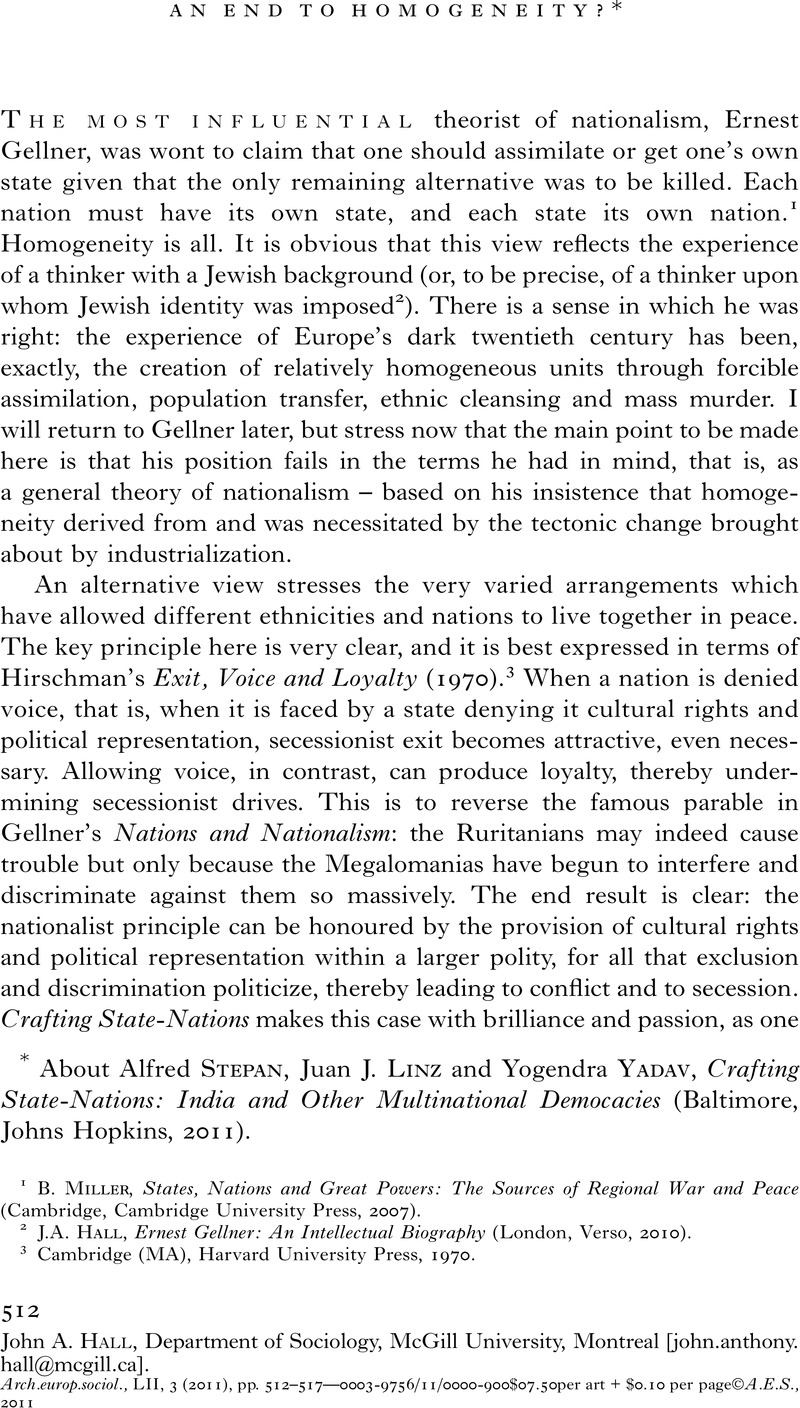Article contents
AnEndToHomogeneity? - Alfred Stepan, Juan J. Linz and Yogendra Yadav, Crafting State-Nations: India and Other Multinational Democacies (Baltimore, Johns Hopkins, 2011).
Published online by Cambridge University Press: 10 February 2012
Abstract

- Type
- Book Reviews
- Information
- European Journal of Sociology / Archives Européennes de Sociologie , Volume 52 , Issue 3 , December 2011 , pp. 512 - 517
- Copyright
- Copyright © A.E.S. 2011
References
1 B. Miller, States, Nations and Great Powers: The Sources of Regional War and Peace (Cambridge, Cambridge University Press, 2007).
2 J.A. Hall, Ernest Gellner: An Intellectual Biography (London, Verso, 2010).
3 Cambridge (MA), Harvard University Press, 1970.
4 D.D. Laitin, Nations, States and Violence, Oxford, Oxford University Press, 2007; D. Horowitz, Ethnic Groups in Conflict (Berkeley, University of California Press, 1985); A. Wimmer, Waves of War: Nationalism and Ethnic Politics in the Modern World, forthcoming; B. O’Leary, ‘An Iron Law of Nationalism and Federation? A (Neo-Diceyian) Theory of the Necessity of a Federal Staatsvolk, and of Consociational Rescue’, Nations and Nationalism, 7: 273-96 and ‘Debating Consociational Politics’, in S. Noel (ed.), From Power-Sharing to Democracy: Post-conflict Institutions in Ethnically Divided Societies (Kingston and Montreal, McGill-Queens’ University Press, 2005).
5 See also D. Laitin, Language Repertoires and State Construction in Africa (Cambridge, Cambridge University Press, 1992). The authors are well aware of the problem of Kashmir. Their precise claim is that India works well when it is true to its liberal principles; when these are ignored, trouble follows.
6 J. Darwin, ‘Empire and Ethnicity, Nations and Nationalism, 16, 383-401, 2010.
7 A. Wimmer, L.-E. Cederman and B. Min, ‘Ethnic Politics and Armed Conflict’, American Sociological Review, 74: 316-37, 2009.
8 A. Wimmer, ‘A Swiss Anomaly? A relational account of national boundary making’, Nations and Nationalism, 17: 718-37.
9 Crafting State-Nations has striking passages dealing with Punjab and Mizoram, both case were successful crafting took place in difficult circumstances. The same point applies to Tamil Nadu, as demonstrated by N. Subramaniam,Ethnicity and Popular Mobilization: Political Parties, Citizens, and Democracy in South India (Oxford, Oxford University Press, 1999) on whom their account relies. D. Posner, Institutions and Ethnic Politics in Africa (Cambridge, Cambridge University Press, 2005) makes the same case for Africa.
10 I refer here particularly to the two papers of B. O’Leary cited above.
11 M. Lange, Educations in Ethnic Violence (Cambridge, Cambridge University Press, 2012).
12 S. Saideman and R.W. Ayres, For Kin or Country: xenophobia, nationalism and war, New York, Columbia University Press, 2008.
- 1
- Cited by


